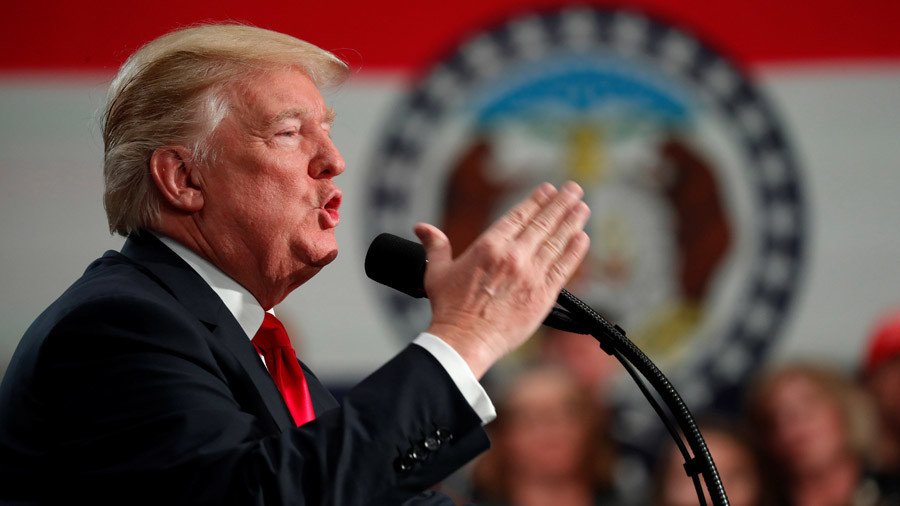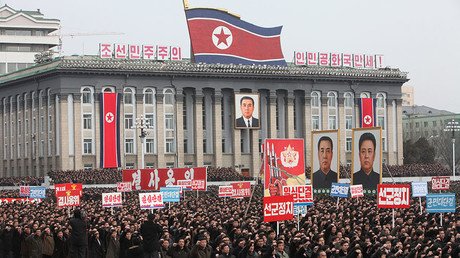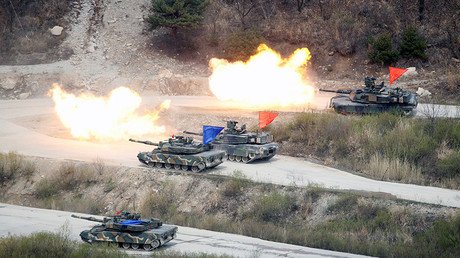‘No impact’: Trump slams China for inability to exert influence on Pyongyang

China’s efforts to influence North Korea’s policy through negotiations have apparently failed, the US President Donald Trump said. He particularly said that the Chinese envoy’s visit to Pyongyang yielded no results.
“The Chinese Envoy, who just returned from North Korea, seems to have had no impact on Little Rocket Man,” Trump tweeted, referring to North Korean leader Kim Jong-un. Beijing sent a special envoy, Director of the Communist Party’s International Liaison Department Song Tao, to Pyongyang for the first time since late 2016 in mid-November.
The Chinese Envoy, who just returned from North Korea, seems to have had no impact on Little Rocket Man. Hard to believe his people, and the military, put up with living in such horrible conditions. Russia and China condemned the launch.
— Donald J. Trump (@realDonaldTrump) November 30, 2017
US State Secretary Rex Tillerson, however, welcomed the Chinese efforts aimed at resolving the crisis on the Korean Peninsula. However, he also said that Beijing should do even more by particularly imposing stricter restrictions on its oil exports to North Korea.
“The Chinese are doing a lot,” Tillerson said on Thursday. He added, though, that the US “does think they could do more with the oil.”“We're really asking them to please restrain more of the oil, not cut it off completely,” he said in remarks at the State Department, as reported by Reuters.
Earlier, Trump hailed the Chinese decision as a “big move,” adding that he would see “what happens.” He also urged President Xi Jinping to act fast to rein in North Korea, warning that “time is quickly running out.”
The US president has repeatedly said that China should play a more active role in containing Pyongyang’s nuclear ambitions. Meanwhile, Washington and Beijing have held substantially different views on how to handle the crisis on the Korean Peninsula.
While Washington tends to resort to threats, pressure and sanctions; Beijing, together with Moscow, has called for restraint and dialog to resolve the issue. Most recently, China called on all “relevant parties” to resume talks and make efforts to settle the crisis “through dialogue and consultation.” The statement was made after the US added Pyongyang to its list of terrorist sponsors.
However, the recent developments have once again heightened tensions around the peninsula. Trump’s latest comments came after Pyongyang tested yet another ballistic missile, which the Pentagon claimed was intercontinental. North Korea also stated that it was a new type of intercontinental ballistic missile capable of hitting the US mainland.
The missile launch provoked an angry reaction in the US. On Thursday, the US Ambassador to the United Nations Nikki Haley warned that the test had brought Pyongyang and Washington “closer to war” and called for additional sanctions against North Korea. Trump also announced that he would put forth “additional major sanctions” against the North.
Earlier, in November, North Korean Ambassador to the UN Han Tae Song ruled out negotiations on its nuclear program. He explained Pyongyang’s decision by citing the “hostile” policy of the US, as well as joint US-South Korean military drills in the region.
China and Russia came up with the so-called “double-freeze” plan to resolve the Korean crisis soon after the tensions escalated in early September. The two countries called it the only viable alternative to a “catastrophe, where there will be no winners or losers.”
The plan envisages the US and its allies halting all major military exercises in the region in exchange for Pyongyang suspending its nuclear and ballistic missile program. The initiative was, however, turned down by Washington, with Haley denouncing it as “insulting.”
Meanwhile, Russia believes that the latest North Korean missile launch was in fact triggered by hostile rhetoric from the US and constant pressure that Washington exerts on Pyongyang. Russian Senator Konstantin Kosachev, the head of Russia's Foreign Affairs Committee, pointed out that Pyongyang “demonstrated restraint” and made no provocative moves for over two months prior to the launch, apparently expecting the same restraint from the US.
However, over the same period, the US conducted several military drills in the region together with its allies, with some of the exercises involving three US aircraft carriers. The North’s decision to remind Washington of its own military capabilities apparently shows that Pyongyang’s patience has run out, Kosachev said.














